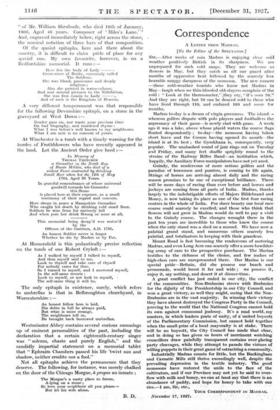Correspondence
A LETTER FROM MADRAS.
[To the Editor of the SPECTATOR.] SIR,—After weeks of rain Madras is enjoying clear cold weather positively British in its sharpness. We are unprepared for such cold snaps. They are welcome as flowers in May, but they catch us off our guard after months of oppressive heat followed by the scarcely less bearable muggy dampness of the monsoon. The new corners —those cold-weather tourists who know not Madras in May—laugh when we thin-blooded old-stayers complain of the cold : "Look at the thermometer," they cry, "it's over 70.4 And they are right, but 70 can be deuced cold to those who have lived through 110, and endured 100 and more for months.
Madras to-day is a dream of virgin greenness. The island-- whereon golfers dispute with polo players and footballers the supremacy of their game—is newly clad with grass. A week ago it was a lake, above whose placid waters the course flags floated despondently ; to-day—the monsoon having taken short leave and the Cooum having opened its mouth—the island is at its best ; the Gymkhana is, consequently, very popular. The unabashed sound of jazz rings out on Tuesday and Friday, and many feet shuffle sprightly round to the strains of the Railway Rifles Band—an institution which, happily, the Auxiliary Force manipulators have not yet axed.
Guindy, the rendezvous of more serious golfers and the paradise of horsemen and punters, is coming to life again. Strings of horses are arriving almost daily and the racing season promises to be one of exceptional brilliance. There will be more days of racing than ever before and horses and jockeys are coming from all parts of India. Madras, thanks largely to the indefatigable efforts of Majors Hildebrand and Money, is now taking its place as one of the first four racing centres in the whole of India. For sheer beauty our local race course could scarcely be excelled:' and those who think that flowers will not grow in Madras would do well to pay a visit to the Guindy course. The changes wrought there in the past ten years are incredible to those who knew the course when the only stand was a shed on a mound. We have now a palatial grand stand, and numerous others scarcely less palatial, and totalisators in keeping with their grandeur.
Mount Road is fast becoming the rendezvous of motoring Madras, and even Long Acre can scarcely offer a more bewilder- ing array of cars to the prospective purchaser. The Marina testifies to the richness of the choice, and few makes of high-class cars are unrepresented' there. Our Marina is our special pride—Britain, did she possess our beach and promenade, would boost it far and wide ; we possess it, enjoy it, say nothing, and desert it at dinner-time.
A great conflict has just ended in our city, the conflict of the communities. Non-Brahmins strove with Brahmins for the dignity of the Presidentship in our City Council, and won a great victory, as well they might, seeing that the Non- Brahmins are in the vast majority. In winning their victory they have almost destroyed the Congress Party in the Council, proving to the world that the National Congress cannot hold its own against communal jealousy. It's a mad world, my masters, in which leaders prate of unity, of a:united boycott of the Parliamentary Commission, but cannot hold together
when the small prize of a local mayoralty is at stake. There will be no boycott, the City Council has made that clear, and in doing so has given us hours of merriment watching councillors draw painfully transparent curtains over glaring party cleavages, while they attempt to parade the virtues of willing puppets in their great game of ostracizing a community.
Industrially Madras counts for little, but the Buckingham and Camatic Mills still thrive exceedingly well, despite the prevailing depression in the textile industry. The good monsoons have restored the smile to the face of the cultivators, and if our Province may not yet be said to over- flow with milk and honey, we can at least say that there is an abundance of paddy, and hope for honey to take with our rice.—! am, Sir, etc.,
November 17, 1927.
YOUR CORRESPONDENT IN MADRAS.


























 Previous page
Previous page